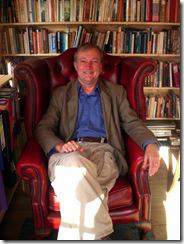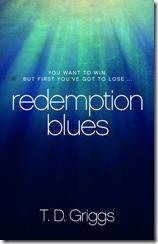It’s my great pleasure to present an interview with Tim Griggs, author of Redemption Blues, Distant Thunder and The Warning Bell (as Tom Macaulay). It’s a real delight to hear about Tim. Look at the photo’ of him and imagine yourself sitting opposite him and listening to him say these very words.
+ Steve

I suppose it sounds like a stock answer (like the way all bad-boy actors were expelled from school) but I have always wanted to write. Before I even could write. This was in part because my father was a writer of teenage adventure novels and children’s books in the 1950s, and I idolized him. He had picked up a lot of material, to put it mildly, during three wartime years with the RAF on a high-speed launch in the English Channel. He didn’t share that with me, but he was constantly making up stories, many of which I can still remember. He’s been dead for decades, but I have tried to pay some sort of a tribute to him by drawing on many of his experiences in my recent book The Warning Bell (Orion Books, 2010, written under my one-time pen-name of Tom Macaulay). It’s a modern father-son story with links to WW2 and set in part upon a wartime RAF launch.
Still, there must have been more to it than my Dad’s influence, because I had three siblings and none of them showed any interest in fiction writing. I suppose I’m just wired that way: certainly the spell started working on me very, very early.
Do you usually write in the same genre you tend to prefer to read?
Half and half. I’ve always enjoyed reading crime, although for some reason I find it harder to feel satisfied with the genre since my own mystery novel Redemption Blues was first published. Perhaps reading in this field is too much like work, or maybe I’m just insanely jealous of more successful writers. Also, I tend to prefer crime and mystery which has a certain psychological complexity – Le Carré, Len Deighton – and (call me old-fashioned) that’s not so easy to get hold of right now.
As you know, I also write historical fiction (my latest is Distant Thunder, Orion Books, 2013) which is a late-Victorian epic, full of action and colour. I do enjoy reading some other historical writers – Lindsey Davies, C.J Sansom, Patrick O’Brian – and I am easily seduced by historical non-fiction and biography, too. In fact if I’m not careful, I can distract myself for days in the name of ‘research’.
When reading, do you prefer traditional printed books or ebooks?
I’m old-fashioned enough (and old enough) to prefer print books, but I’m no dinosaur. I’ve had an e-reader for years and use it a lot, especially when travelling.
Print books will never die out, any more than the theatre died when cinema came along, or cinema died when TV made its appearance. These earlier media simply adapt and get better. In the case of print books, we are already seeing them develop into increasingly handsome ‘fetish’ objects, items which are a pleasure to own and to handle. They’ll be more expensive than e-books – they already are – but there will always be people who appreciate the heft of a good tome and the silky touch of good paper, and thus they will continue to be produced.
Do past or current events in your life have an influence on your writing?
Never believe anybody who denies this. Loss, loneliness, fear, love – these are all universals, but each one of us experiences them in our own particular ways. It would be impossible not to be influenced by our own experiences. Mind you, this isn’t always conscious. In The Warning Bell, the main character ‘loses’ his father in his teens: so did I, but I didn’t see the connection myself until the book was published. In Redemption Blues one of the main characters is a guitarist: so am I, even if I am atrocious at it. In Distant Thunder the hero makes his way in the world’s wild places: I’ve done my share of that, too, living in Africa, Asia and Australia as well as Europe.
Have you got a favourite author, who stands well ahead of all others?
If I had to nominate one, I think Patrick O’Brian would get the nod. I have no special affinity with sea stories, but I love his combination of colour, action and complexity. I believe his Aubrey/Maturin pairing will end up being one of the great double-acts of English popular fiction, like Watson and Holmes.

Yes, I’ve embraced the new technology with alacrity. All of my books are available as e-books, and Redemption Blues has just been re-issued for the first time in digital form, so it is enjoying a whole new life. I shall certainly be doing more e-books in future: it is unquestionably the way ahead.
Do you try to write to satisfy what is fashionable, or do you write pieces that you would want to read?
It’s a truism (but also true) that if you identify a bandwagon to follow, it’s already passed. It obviously makes sense to keep an eye on trends in the broadest sense, but I think it’s fatal to try to second-guess your market too precisely. Erotica is in right now, for example, but I dread to think what would happen if I tried to write an erotic book: maybe it would sell in the horror genre. Above all aspiring writers should write books they would like to read themselves.
How do you fit writing into your life? Do you have set times for writing?
I write full-time these days, a rare privilege. I do tend to start writing at about 8.30AM, and that gets me in the mood. I’ll then hit the keys for a couple of hours at a time at various intervals during the day. I don’t have trouble making time to write – that’s obsessive – but I do have to make time for everything else (you know, people, food…that sort of thing).
Do you keep every jotting of ideas, just in case they might be developed at some later date?
Yes. I’ve kept a diary since I was 24 (that’s 40 years ago) and I have folders hopefully marked ‘story ideas’. I do occasionally refer both to the journal and to these folders – especially for short story plots – but I confess that when it comes to novels the central idea sometimes creeps up behind me and hits me over the head.
Do you write freeform or do you faithfully plan every piece meticulously before you start on a piece?
I plan, but then the plan goes out the window and I have to sit down and plan it all again. The broad narrative arc of my novels is always firmly set before I start, though.
When writing, most authors now use a computer of some description. Which do you find more satisfying: writing using any means available, using a computer, using a typewriter or using a pen/pencil?
For notes, nothing beats a pen or pencil and a decent notebook. I have an obsession with handsome notebooks. They don’t require power, no-one wants to steal them, you can drop them, rest your beer glass on then, swat wasps with them, and they still work. You can even write in them.
But the actual business of writing the novel I do on a computer. I used a typewriter for years until the day I unwrapped my first Mac, and that was in 1984, at which point the typewriter became a boat anchor.
Have you ever been somewhere and discovered a copy of a book that’s extremely difficult to find, and drooled over the discovery?
My shelves are half-full of obscure books on arcane subjects which thrilled me when I found them (A History of Machine Guns in Bulgaria, Hitler and his Love of Newts, A Transvestite in Medieval Doncaster) but I have to confess that they tend never to get opened, far less read.
If you’ve had books published in print form, have you ever come across a copy of one of your own books by accident?
All the time. The best example was finding Redemption Blues in a flea-market in Reykjavik. I reasoned that at least someone must have read it.
What is your greatest ambition in writing?
Like a lot of writers, I suspect, I would like to have a reputation and an audience big enough to allow me to forget about marketing altogether, so that I could get on with what I feel I was put on the planet to do – tell stories.
You never know, though: maybe it’s the constant engagement with the market, the need to meet deadlines and to attract attention, which sharpens us up and keeps us hungry.
Certainly it’s been a pleasure answering your questions.
Tim Griggs
Redemption Blues (by T.D.Griggs) is now available for the first time as an e-book. A million sales in hard copies overseas – but it’s hardly been read in UK. If you liked Distant Thunder (by T.D.Griggs) and The Warning Bell (by pen-name Tom Macaulay) then let me brighten your universe once again!
For more info, take a look at my website at www.tdgriggs.co.uk, and follow me on Twitter @TDGRIGGS1.

